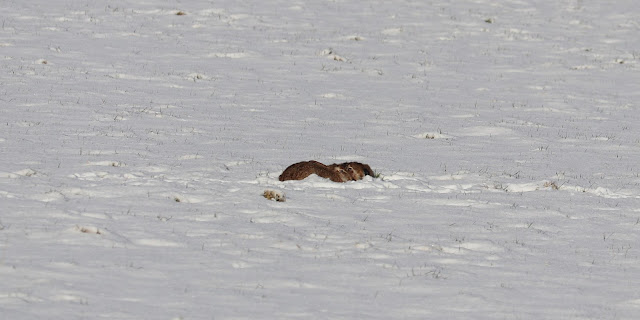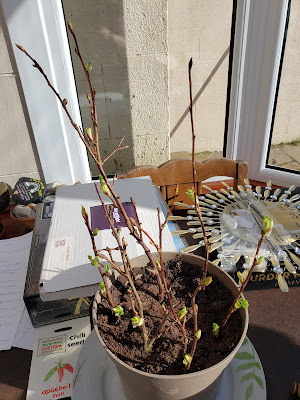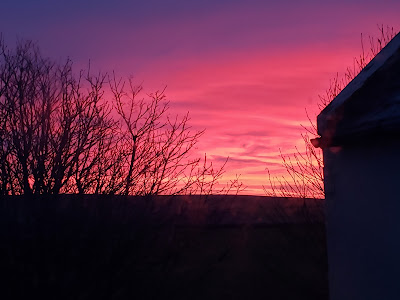Gritty and wild, the hare shivers into rain-dark February.
Bitter winds bully her as the days pursue her.
And she sings,
The Snow Moon, The Crow Moon
The Hunger Moon, The Wolf Moon
The Lenten Moon, The Grass Moon.
Catherine Hyde, The Hare and the Moon, A Calendar of Paintings
I've also heard February's full moon referred to, separately, as The Ice Moon and The Storm Moon.
The Snow Moon. We've had a helping of snow this month. When the snow covered the fields, two hares sat in the meadow all the day long. Just sat there! The snow stayed for three days. During that time, the daily dog walks were punctuated with face-biting hail - tiny balls of ice, harmless on the palm of a glove, but so cruel with the force of the wind onto the skin. Again the snow gave us a canvas from which we were able to identify visitors to Stempster - deer tracks in the garden, fox prints by the gate to the windfarm.
Snowy expedition with sunshine (by Lythmore Farm)
The Crow Moon. I've noticed the crows around us are watching and waiting, often joined by their cousins, the jackdaws. Sometimes I've seen them carrying bits and pieces towards the wood across the windfarm path. Every so often I'll see one struggling with a stick which is almost the same length as the bird itself. They seem to be laying the foundations for their 2024 residences but I'm fairly certain they won't be laying their eggs until April. Crows seem more solitary than rooks. It's said that "one rook's a crow and a flock of crows are rooks". That's not always the case but it makes a good start to the identification process!
The Hunger Moon. This label doesn't apply to us in twenty-first century Britain. Years ago it referred to the hungry time when people had eaten up much of the food which had been stored for the winter months. The fast of Lent fitted well with the empty cupboards. Not so many years ago we gave up desserts for Lent. A friend said we shouldn't go back to having them once we'd become used to our main meal without. So we only have them occasionally now. I'm fine with that - but I do miss rice pud!
The Wolf Moon. January and February both have the Wolf Moon. It used to be said that wolves would howl more at that time of the year because of the scarcity of food then. People don't believe that anymore. It's now thought that they howl just the same at any time of the year. There hasn't been an awful lot of howling in this country, however, since Hunter Polson killed the last wolf near Brora around 1700. There is a monument on the roadside to mark the spot. Today the proposed reintroduction of grey wolves to Scotland is a very grey area - with the welfare of livestock being a major concern for farmers.
Our River Forss, looking over the wee bridge towards the sea
The Lenten Moon. Spring! What could be better? The word comes from the Old English, Lencten, and refers to the season when days lengthen significantly. Here in Caithness, we are in particular need of longer days after a very wintry winter! I can hear the birds singing in the garden - they agree. Okay, they may be squabbling at the feeding station, but it sounds optimistic!
The Grass Moon. We've had temperatures in double figures this month - not often - a couple of days at the beginning of last week - but still, who's complaining? As soon as the thermometer reaches 6°C , we can expect the grass to start growing again. So "Grass Moon" may be an apt name for a full moon in February. Another sign of warmer weather at this time of the year is the emergence of ticks. They are no longer comatosed and wait patiently for a passing host to brush against them so that they can latch on and have a veritable late-winter feast! When I clean out the fire and set a new one in the grate each milder morning, I have a quick look to see if the dogs have brought any livestock in with them and have left them on the floor to keep me company. I'm not a fan of ticks - and have been a bit more anxious about them since a friend told me how she had picked one up in her hair while visiting Australia! It's the parrots!!
The Ice Moon. It isn't very far away - even on milder days the night time temperatures can drop to freezing. The ground is still very cold into March and so, frost and icy puddles are often there in the garden and on the yard when we let the dogs out in the late-February early morning.
Snow plough casualties - now budding happily
The Storm Moon. We've had a run of storms this winter. There was a point when people were saying "Is there no end to it?" It seemed that we had one storm after another. Thursday, 1st February, began with no power. The last day of January had been a stormy one with wind, hail, rain, snow, thunder and lightning. There was a power cut at bedtime and we had no electricity until mid-morning on 1st February. We had to buy a new house phone as the old one was frazzled! It must have received a big voltage surge as it was thereafter defunct! The fields were flattened by the storm. The winds just wouldn't stop battering us. They again reached gale force on the Friday evening. It almost felt as if we were being spun around in the middle of it all. Yes, most definitely a stormy start to February - and we still have the equinoctial gales of March to come - the lambing storms.
Sun setting in a moody sky
Just back from walking the dogs and fizzing with excitement after watching three hares playing between two fields. Theirs seemed to be an organised game of tig. There was joy in their activity - surely this was hare-happiness. Thankfully the dogs didn't get the memo until the hares had all moved on!
The farmer was muck-spreading in the next field. Larks were singing. The sun was shining. Grass was greening. We may be caught out with another spot of winter but the trend is towards springtime.
Our garden flowers are a bit later than those in Englandshire. We have no flowering daffodils at present but some very healthy buds-in-waiting. Our snowdrops are looking lovely around the swing and by the pond. In a few years' time they should form a carpet of dense green and white. We have crocus flowering by the roadside gate into the little wood - yellow ones, cream and purple ones too. Mauve crocus are peeping through behind the pond - they give the impression of being quite timid and unsure of themselves. In the pot by the French windows is a well-matched team of iris reticula - definitely not timid and cheering the greyest of days. Their markings are breathtakingly beautiful - one of my very favourite early flowers.
The challenges of wintertime have been considerable this season 2023/24 but they have done nothing to change my mind about the special nature of our area. Whatever the weather, we are surrounded by beauty. Just a week after seeing fox tracks in the snow, the fox presented himself in the field across the road. It saw Ginny and Judith with the dogs, ran on a little, stopped, looked straight at them and then continued to run away from them. A couple of days before that, an owl - possibly a long-eared owl but we can't be sure - was circling the house. I didn't know until fairly recently that we have long-eared owls here in Caithness. We've heard and/or seen short-eared owls, tawny owls and barn owls here at Stempster but until this month we hadn't come across a long-eared owl. On Saturday last, the night of the full moon and with a temperature of minus one, Ginny and Clemency pulled into the drive, watched by a barn owl. It was sitting in the huge old sycamore in the corner of the orchard - the one we call the "gnarly tree" - simply being a barn owl and soaking up as much information as it could.
Just surveying its surroundings
When I was growing up in the Isle of Axholme, I only knew tawny owls and barn owls. It wasn't until we moved to Orkney in 1986 that I came to know the short-eared owls too. They would fly alongside as we drove along the back road between Finstown and Kirkwall and they sometimes flew low over the fields surrounding our home.
The birds I remember mostly from my childhood in Axholme, are the skylarks, lapwings, herons, pheasants and partridges, fieldfares (felfers) and redwings in autumn and winter, and so many garden and hedgerow birds.
Springtime in our North Lincolnshire garden - about 2008 (Barrow upon Humber)
When I was nineteen I bought my first - and only - pair of binoculars. At the same time I bought myself a copy of "Collins Guide To British Birds" and also a copy of "Collins Guide To Bird Watching". I've scribbled notes and cross references in both - some helpful - others less so - like this one on the inside back cover of "British Birds":
Ostrich = 300lbs (approx.) too heavy to fly
Now, in which of my worlds is that likely to be useful?
£3.80 the pair - not bad for half a century!
The binoculars are still going strong - because I can alter the lens as my eyesight deteriorates - and they now live under the pantry window. Why? Because from there I can see if the red deer have come down from the moors to graze with our roe deer. This has happened before - not often, but when food is scarce they will take a chance.
On Valentine's Day, here as in England, you don't need binoculars to find birds pairing up ahead of the breeding season. They're everywhere - almost as if they are proving a point - this day is not just for humans - the birds share it too. National Nest Box Week began on 14th February. What a great day and what a great idea to increase the accommodation we have available for the birds. Yes, they find places without our help, but it's always nice to give something back to them when they give us so much help and pleasure. Choose a sheltered site and make sure it's placed at least a metre from the ground. The farm cats walk along our walls sometimes so we have to be careful not to encourage birds into places they can reach. I have an owl box, given to me as a present, which needs to be up very high - and this is the reason it's still waiting to be put in place!
One lasting February memory of the countryside where I grew up is of water, lots of water in the fields and lanes, so that ditches ran over onto the edges of the roads. The ditches themselves had little pockets of dirty snow tucked away within their slopes. Bent reeds were grouped along some of them and whispered in the wind - quite an uncanny sound if you're not used to it.
My memories of the Isle of Axholme in February also include images of overcoated men, tied up at the waist and around the trouser turn-ups, layering and repairing hedges. They didn't flail with machines. They used billhooks and axes and other simple hand-held tools. The results were outstanding - a neat hedge which provided wildlife with food and shelter and kept stock from wandering off. A good hedger was a local gem. The same men would clean out the ditches/dykes too. They would use dredging buckets and long handled hooks to free the watercourses of weeds and debris. For this they would need their wellies! Some men wore flat caps and old woollen scarves, others wore ancient felt hats. I can picture some of them with cigarettes hanging over bottom lips and steaming breath mixing with cigarette smoke as they huddled together around their wooden push-cart.
How easy it is to forget the misery of those winter jobs. Lovely memories for me but the coldest and wettest of jobs for those men in my village.
How sweet the moonlight sleeps upon this bank! (Shakespeare)
February will soon become March - after an extra day this year. The sun is already noticeably higher and it seems to give out a little warmth too. The days are longer and the promise is here of another springtime. When I was young I thought dramatic Autumn was the best season. Then I became unsure whether I liked Autumn the best or Spring the best. Now I'm certain that Spring is the best season of all. It's all about new life and the world's young - innocent and pure and good.
The Owl by Alfred Tennyson (the hay is not new-mown but it smells of summer when the farmer puts it out into the field for the livestock - and we do have windmills!!!)
When cats run home and light is come,
And dew is cold upon the ground,
And the far-off stream is dumb,
And the whirring sail goes round,
And the whirring sail goes round;
Alone and warming his five wits,
The white owl in the belfry sits.
When merry milkmaids click the latch,
And rarely smells the new-mown hay,
And the cock hath sung beneath the thatch
Twice or thrice his roundelay,
Twice or thrice his roundelay;
Alone and warming his five wits,
The white owl in the belfry sits.












Comments
Post a Comment